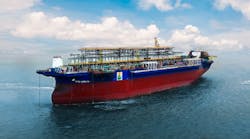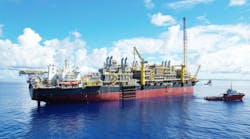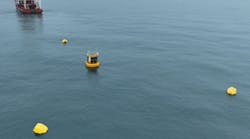Offshore staff
RIO DE JANEIRO, Brazil — Petrobras has contracted a consortium of Alcatel Submarine Networks (ASN) and Maersk Supply Service to construct/install a permanent seismic monitoring system (PSMS) in the Mero Field in the presalt Santos Basin, 180 km offshore Rio de Janeiro.
The project will deploy 4D seismic monitoring technology to track reservoir behavior over time. Data acquired should broaden knowledge of distribution of fluids in the reservoir and support more efficient oil production from the Mero Field, Petrobras said.
The consortium will supply and install 400 km of optical fibers across a 200-sq-km seabed area. The optical fibers will be connected to the FPSO Sepetiba, which will provide onshore teams in Petrobras with remote and instant access to data generated by the monitoring system.
Installation of the PSMS will begin next year.
The full scope of the consortium’s contract covers engineering, procurement, construction, installation and operation of the PRM system, which will be based on the Optowave technology developed by ASN Norway.
ASN will deploy its resources and subcontractors in Europe and in Brazil for engineering, manufacturing, installation and commissioning of the system, while Maersk Supply Service will manage, engineer and execute the offshore installation from its office in Rio, allocating one of its I-Class subsea support vessels for the offshore operation.
Optowave PRM systems installed on other offshore fields have been recording seismic data for many years, for onward delivery to onshore processing centers to develop high-resolution images of the reservoir.
These images are compared over the years to assess changes in reservoir pressure and the location and movement of the fluids.
ASN President Alain Biston said this would be the first presalt PRM with more than 4,400 four-components stations in deepwater.
Petrobras and the Libra Joint Project team reported during the 16th International Congress of the Brazilian Geophysical Society: “The motivations for investing in a frequent, high-density/high-repeatability 4D scheme on Mero stems from the anticipated added value of 4D information to directly assist a production drive, based on WAG – alternating water and gas reinjection.”
02.15.2023









